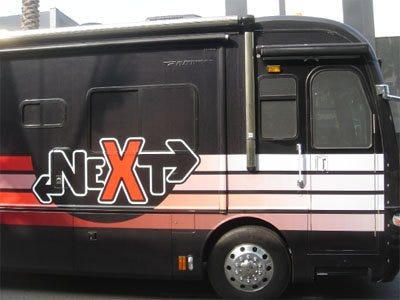My 'NEXT' Adventure: Behind the Scenes of MTV's Reality TV Dating Show
As a Season 4 alum of the cult MTV series, I’ve found little trace of my episode (or season) online; MTV hasn’t responded to requests for footage at the time of this writing
The year was 2007-ish and it was peak MTV dating show craze. I was being picked up from my Playa Vista apartment in a towncar and taken to the set of NEXT. Armed with youthful optimism, a denim mini skirt, and a custom-made "Oregon's Finest" t-shirt, I was ready for what I thought would be a fun, albeit scripted, experience.
The premise of NEXT was straightforward: one contestant (me) dates potential partners, who earn $1 for every minute they last. At the end of the date, the potential partner can choose to either take the money or go on a second date. But it’s important to note that reality TV is far from real.
First things first, spontaneity is not on the menu. The producers orchestrate every aspect. Sure, my initial reaction may be real but I didn’t realize I’d have to recreate multiple takes of me dismissing each dater so they can shoot from all angles. Then production would feed me a snarky one-liner for maximum drama. The guys were given scripted comebacks too, most of which centered on me being skinny. If we tried to talk between takes, production would shut it down with “let’s wait until we’re rolling,” or they’d escort me back to my trailer.
As a Black woman on reality TV, I couldn't help but notice that while I was a 21-year-old hottie, the bus full of guys waiting to date me was more personality types than heartthrobs. It wasn’t like the casting they did for the white girls; they always seemed to get a lineup of Abercrombie model types. Like, they couldn’t find one tall, athletic Black man with a million-dollar smile? The casting felt like it was engineered for comic relief or awkwardness, not connection. In real life, I would never body shame anyone, even if I wasn’t attracted to them. And yet, the one-liners production handed me felt unnecessarily cruel, things no one should say to a stranger, let alone on camera. I came off like a picky, mean girl. But that’s exactly how reality TV has historically painted Black women: as difficult, loud, or hypercritical. It’s a familiar trope: masterfully crafted in the edit and sold as entertainment.
Reflecting on my NEXT experience, I can see how these shows were more about spectacle than sincerity. Still, it gave me a fun dinner party story and I was part of a cultural moment. We were heading into a recession, the Writers Guild of America was on strike, and networks were desperate for cheap-to-produce content. Reality TV became the default. From Flavor of Love to I Love New York, we watched legends like Tiffany Pollard and Real Housewives of Atlanta’s Nene Leakes become icons—people we've been quoting and meme-ing for nearly two decades. Honestly, those early reality stars paved the way for today’s influencers. NEXT walked so that YouTube dating experiments like “Pop the Balloon” could run. And here we are, in another recession, watching history remix itself.
Whether it was NEXT, Room Raiders, Date My Mom, or Elimidate, many of us saw those shows as a come-up. First, you were being paid. Second, if you were a model or actor, it helped you get an agent or rack up on-camera credits. And third, if you were lucky, you’d walk away with a lil boo. I didn’t end up dating anyone from the show (I NEXT-ed everyone lol), but MTV did reach back out, hoping to cast me in another reality series that never aired. The working title was House Broken. The premise? A house full of “unsuccessful” singles from other shows, and each day a new batch of daters would arrive to take us out. The goal for housemates was to land a second date and be able to move out of the house.
At first, I was intrigued. I went through the casting, psychiatric screenings (where I first learned I had ADHD and wouldn’t do anything with that info for another 7 years) and STI testing. I saw some of the other potential cast members… chile, EVERYONE was hot. The catch: I’d have to live in the house for at least a week. Production knew I had a toddler and couldn’t be away that long. I declined. They offered more money. I resisted again. They offered even more, promising to stage a big, early exit for me. I almost said yes. But it wasn’t the money or even motherhood that stopped me.
I knew who I was at that time. I was 21, single, living in LA, and definitely getting it in. I knew from the vibe that hormones would’ve gotten the best of me on that show. I couldn’t have my sweet grandparents watch me hook up on national TV! So I declined, and that was the end of my reality TV career.
As for NEXT, here’s a fun epilogue: there’s a high-end cannabis company in Portland now called “Oregon’s Finest,” where their early branding was the same font as my old t-shirt. It made me wonder—did someone there catch my episode and get inspired? Maybe. Maybe not. But it’s a small, unexpected legacy from my brief moment in the absurd, unforgettable world of early 2000s reality TV.






